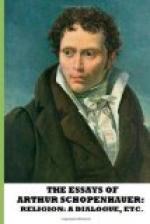Now and then one learns something, but one forgets the whole day long.
Moreover our memory is like a sieve, the holes of which in time get larger and larger: the older we get, the quicker anything entrusted to it slips from the memory, whereas, what was fixed fast in it in early days is there still. The memory of an old man gets clearer and clearer, the further it goes back, and less clear the nearer it approaches the present time; so that his memory, like his eyes, becomes short-sighted.
* * * * *
In the process of learning you may be apprehensive about bewildering and confusing the memory, but not about overloading it, in the strict sense of the word. The faculty for remembering is not diminished in proportion to what one has learnt, just as little as the number of moulds in which you cast sand, lessens its capacity for being cast in new moulds. In this sense the memory is bottomless. And yet the greater and more various any one’s knowledge, the longer he takes to find out anything that may suddenly be asked him; because he is like a shopkeeper who has to get the article wanted from a large and multifarious store; or, more strictly speaking, because out of many possible trains of thought he has to recall exactly that one which, as a result of previous training, leads to the matter in question. For the memory is not a repository of things you wish to preserve, but a mere dexterity of the intellectual powers; hence the mind always contains its sum of knowledge only potentially, never actually.
It sometimes happens that my memory will not reproduce some word in a foreign language, or a name, or some artistic expression, although I know it very well. After I have bothered myself in vain about it for a longer or a shorter time, I give up thinking about it altogether. An hour or two afterwards, in rare cases even later still, sometimes only after four or five weeks, the word I was trying to recall occurs to me while I am thinking of something else, as suddenly as if some one had whispered it to me. After noticing this phenomenon with wonder for very many years, I have come to think that the probable explanation of it is as follows. After the troublesome and unsuccessful search, my will retains its craving to know the word, and so sets a watch for it in the intellect. Later on, in the course and play of thought, some word by chance occurs having the same initial letters or some other resemblance to the word which is sought; then the sentinel springs forward and supplies what is wanting to make up the word, seizes it, and suddenly brings it up in triumph, without my knowing where and how he got it; so it seems as if some one had whispered it to me. It is the same process as that adopted by a teacher towards a child who cannot repeat a word; the teacher just suggests the first letter of the word, or even the second too; then the child remembers it. In default of this process, you can end by going methodically through all the letters of the alphabet.




